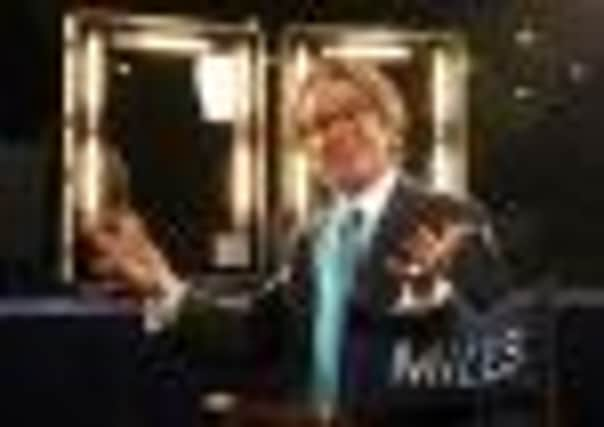Edinburgh International Festival treasures to give the Olympics a run for its money


A BLOOD-SOAKED, Polish language production of Macbeth performed on a multi-storey theatre set built inside a giant agricultural hall close to the city airport has set the tone for the Edinburgh International Festival’s 2012 programme.
Festival director Jonathan Mills unveiled a strong and striking line-up for the Olympic year yesterday, in what critics declared his strongest programme since his debut in 2007.
Advertisement
Hide AdAdvertisement
Hide AdThe programme ranges from the heights of Wagnerian opera to a didgeridoo master from Australia and the court musicians of the Emperor of Japan.
It features the “best of British” orchestras and opera companies, from the London Symphony Orchestra to Opera North, among 3,000 artists from 47 countries.
The festival features 185 performances ranging from three major Shakespeare productions, to the Marinsky Ballet of St Petersburg’s lavish version of Prokofiev’s Cinderella. It includes 11 plays, eight operas, 13 dance pieces and 51 concerts.
The Shakespearean offerings are part of the World Shakespeare Festival, a cornerstone of this year’s Cultural Olympiad. Alongside 2008:Macbeth, a multi-media production set amid a Middle Eastern war on terror with a machine-gun toting Major Macbeth, they include a Russian Midsummer Night’s Dream, and the Irish cabaret singer Camille O’Sullivan performing the narrative poem The Rape of Lucrece.
The festival’s turnover tops £10 million this year for the first time, with a 15 per cent rise in sponsorship, meaning “2012 is a big festival,” according to Mr Mills. Last year, people from 74 countries bought tickets.
Scottish Opera is back in the festival programme this year, although the National Theatre of Scotland is not, after its ill-starred production of Caledonia in 2010. The NTS will have work in the Edinburgh Fringe this year, the company confirmed.
Romanian director Radu Stanca, whose dark extravaganza Faust was both loved and loathed when it was staged at the Royal Highland Centre in 2009, returns with a world premiere of Gulliver’s Travels.
Advertisement
Hide AdAdvertisement
Hide AdFaust played for just four nights at the venue. This year the centre’s Lowland Hall will host three major productions, including 2008:Macbeth and a Python-esque German-English take on My Fair Lady set in a language school. In a year aimed at presenting “a new generation of talent”, the Russian version of A Midsummer Night’s Dream, incorporating elements of As You Like It, comes from Moscow’s School of Dramatic Art.
Other young ensembles include the European Union Youth Orchestra, the Gustav Mahler Jugendorchester and Juliard Dance School from New York.
Near certain sell-outs at the festival include Welsh National Opera’s concert performance of Wagner’s Tristan and Isolde, and the soprano Deborah Voigt’s Usher Hall recital.
Stranger fare includes Helikopter, a dance to sound of helicopter blades, and Breathe, a dance piece featuring didgeridoo player William Barton. The festival returns to Greyfriars Kirk with concerts ranging from early music to a master of the Afghan rubab instrument, Homayun Sakhi.
Gagaku, in a single performance in the Festival Theatre, features the Imperial Court Music and Dance of Japan, who play for the Imperial Household in a tradition dating back to fifth-century Japan.
Scottish Opera has four new short operas, three of them by Scottish composers, in the programme. They include The Lady from the Sea, the story of a lighthouse-keeper’s daughter, by the film and concert composer Craig Armstrong, and Clemency, a dark modern version of a Biblical tale by James MacMillan.
Librettists for the four works include the Scottish novelists Zoe Strachan and Louise Welsh.
Advertisement
Hide AdAdvertisement
Hide AdThe opera’s general director, Alex Reedijk, called them “a testament to Scottish Opera’s commitment to commissioning new work, and interest in reflecting on what our art form might mean in the 21st century”.
Mr MacMillan also features in an expanding series of talks at the festival sponsored by the British Council and Edinburgh University, looking at artistic “truces”. Other forums will explore themes from “What Does it Mean to be British”, to classical music’s struggle to be popular, and Scottish nationhood.
The festival is not themed like Mr Mills’ past outings, examining the far borders of Europe or Asia. It is billed as “a festival to embrace the world”, with the cover adorned with white doves, reflecting a message of peace.
“What we are trying to suggest by this programme are the values of peacefulness, and sharing culture, which underpin both an Olympic year, and the Edinburgh festival itself,” Mr Mills said. “We breathe the same air.”
Mr Mills confirmed that he sees 2014 as his final year with the festival, in a year when he set his sights on exploiting the cultural side of the Commonwealth Games. While the festival’s total turnover topped £10m this year, he said: “An enterprise like this anywhere else in the world would cost far more than that”.
He insisted that the 2012 Olympics, with its closing ceremony four days after the festival opens, is an opportunity rather than a challenge.
He said: “This is a great opportunity for the UK, this is a great opportunity for Scotland, this is a great opportunity for Edinburgh.”